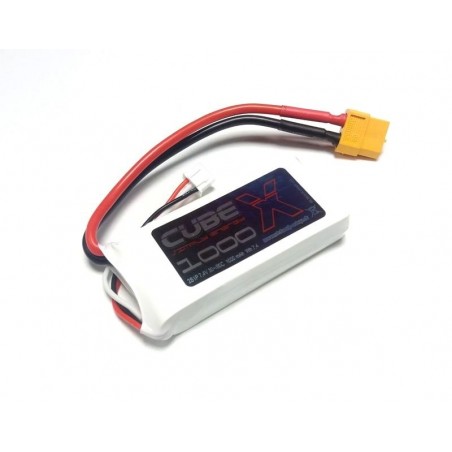SLS Lipo batteries are batteries designed for demanding users. Durability, high charge and discharge current, excellent weight / performance ratio and good price put them at the forefront of the most reliable lithium-polymer batteries.
Specification:
- voltage: 7.4V
- nominal capacity: 1000 mAh
- max. continuous discharge current: 30A (30C)
- max. instantaneous discharge current: 60A (60C)
- typical charging current: 1A (1C)
- permissible charging current: 4A (4C)
- package weight with cables and high-current connector: 72 g
- dimensions LxWxH: 72x35x14 mm
- balancer output: XH
- high current silicone cables: AWG 14
- high current connector: XT60
- length of power cables: 12 cm
Safe use of LiPo batteries:
Mishandling of Lithium Polymer batteries can lead to an explosion, cause fire and poisoning with toxic gases. As we cannot directly control the correct handling of LiPo batteries, we cannot be held liable for any damages whatsoever.
Always charge the batteries in a fireproof container so that in the event of a battery catching fire, it will not spread the fire. Use the battery only for the remote control of model aircraft, ships and motor vehicles. Always store the batteries in a dry and dark place at room temperature. They should never be exposed to direct sunlight or high temperatures. Store LiPo batteries away from children and unauthorized persons.
Only use chargers suitable for charging Lithium Polymer batteries.
The use of a balancer is recommended in the charging process, which monitors the voltage at each cell and equalizes the voltage throughout the package. The balancer protects individual targets against overcharging and undercharging, which is harmful to them. Even a slight overcharging (max voltage 4.2V / 1 cell) can damage them.
Always supervise the charging process.
Always follow the information printed on each battery including the number of cells, permissible continuous and instantaneous discharge current (e.g. 30C / 60C), permissible charging current (SLS batteries up to 4C).
Batteries under load never discharge below 3.3V per cell, and without load below 3.75V per cell.
NOTE: SLS batteries, due to their high efficiency, maintain a stable, high voltage level until the end of their capacity
If the LiPo is not used for a long time, do not store it - IN ANY CASE - fully charged, but approximately 3.8V per cell.


